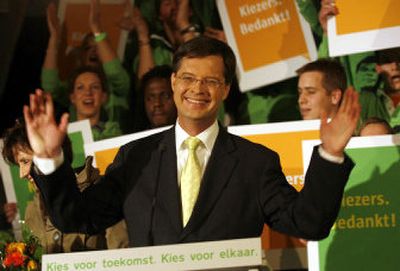Dutch show division in vote

THE HAGUE, Netherlands – Dutch Prime Minister Jan Peter Balkenende’s right-of-center Christian Democratic Appeal party, which has led efforts to curtail Muslim immigration at a time of growing xenophobia in the Netherlands, won the most seats in parliamentary elections Wednesday, but voters voiced strong discontent with his government by giving unprecedented support to extremist parties at both ends of the political spectrum.
After half a decade of politically motivated murders and some of Europe’s most acrimonious debate over the rapid influx of immigrants into this once homogenous country, election results reflected a public schizophrenia over how to resolve the country’s problems and laid a political minefield for creating a coalition that can effectively govern the country.
As expected, no party won enough seats for a majority in the lower house of Parliament. The erratic voting patterns shifted significant numbers of seats to parties with extremist views and robbed moderate parties of influence – a result that stunned government officials and political analysts.
“It’s a new signal from the voters,” said Jan Marijnissen, leader of the Socialist Party, which won the third-highest number of seats in one of the biggest upsets of the day. The party promotes an anti-globalization, anti-European platform and advocates greater public spending on the poor and elderly.
But officials said the new signals are so mixed, it will be difficult for parties with similar ideologies to gather enough support to form a stable government. Balkenende said Wednesday night that his party would “build on the foundation we laid” but conceded that the election returns were “complicated” and that coalition negotiations, which could take months, would demand “a level head and perseverance.”
“I’m satisfied that my party comes out as the winner, as the biggest party,” Foreign Minister Bernard Bot, a member of the prime minister’s Christian Democratic Appeal, said in a telephone interview from the party’s boisterous campaign headquarters. “But you also see the other parties are scattered over the globe of opinions and views. You have 20 to 25 percent of the people looking for a new alternative but not quite able to express themselves in a coherent way.”
With 98 percent of the votes counted early today, Balkenende’s CDA won 41 seats; the left-of-center Labor Party, 32; Socialist Party, 26 – more than tripling its current seats; and the People’s Party for Freedom and Democracy, a fiscally conservative party that also opposed European Union political integration, 22 seats.
Right-wing parliamentarian Geert Wilders, who advocates banning all immigration and who has been the lone voice for his one-man party, won nine seats for his party in the next parliament.
At the opposite end of the political spectrum, a newly created animal rights party that wants to see animals rights incorporated in the constitution and opposes many industrial forms of agriculture, was expected to win two seats.
The rancor over immigration fueled a nationwide debate on such issues as racism and Islamaphobia, once deemed too politically incorrect for public discussion in a country with a reputation for social tolerance, and helped force open a political selection process historically dominated by an entrenched elite with little regard for public sentiment.
Voter turnout, estimated at 78 percent, though high by U.S. standards, was a few points lower than previous Dutch elections. The high voter turnouts are due in part to Dutch law that does not require voters to show up in person to cast their ballots; a family member or other designated individual can present a valid, signed voter card for those who can’t or don’t want to go to one of the country’s 10,000 polling stations.